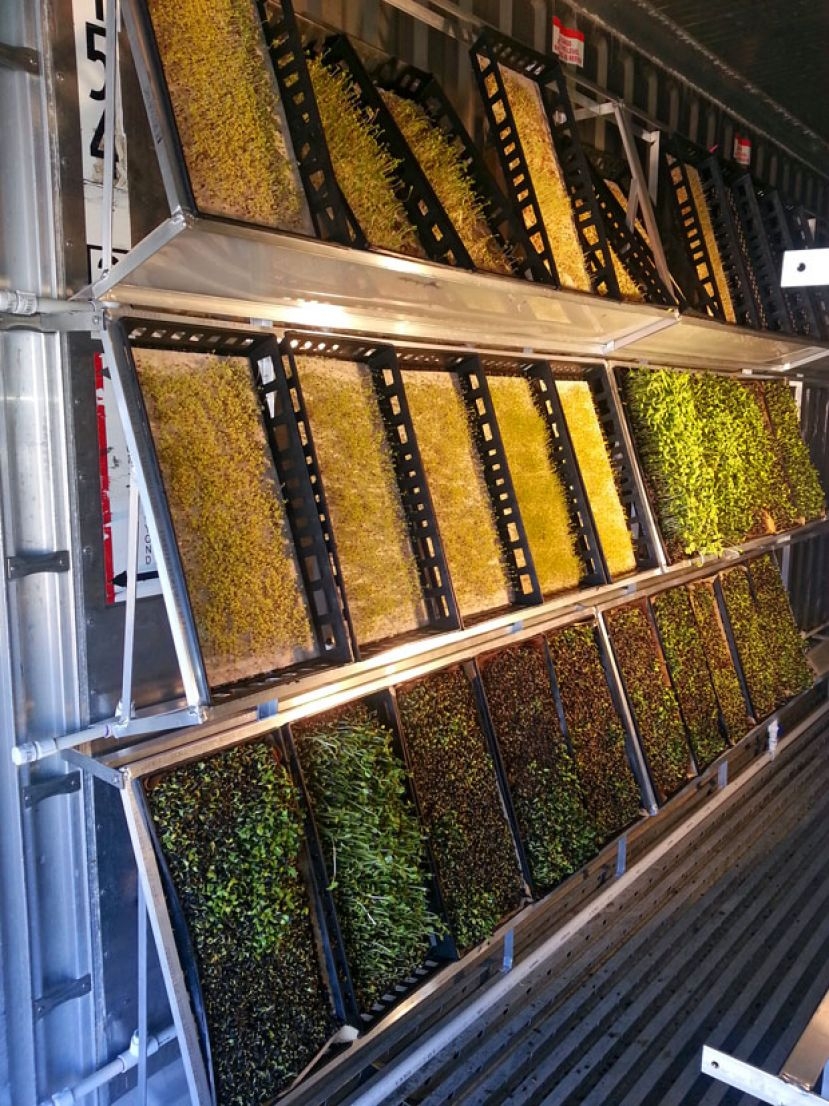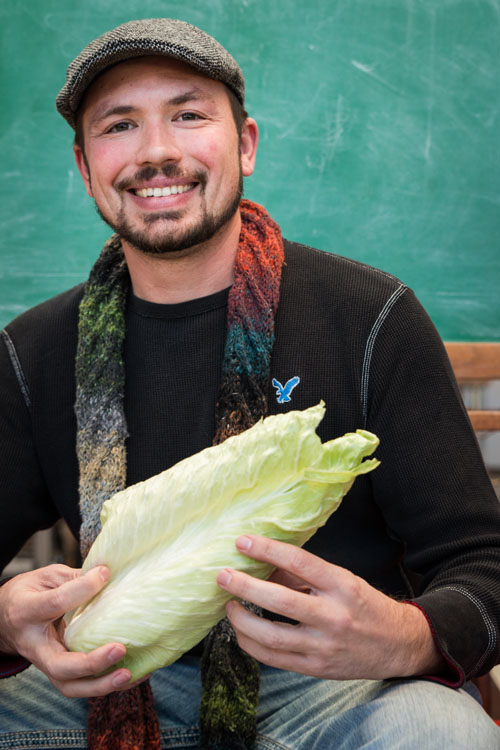Most of the food Americans consume is trucked in from hundreds of miles away. Eric Wilson, co-founder and CEO of Gro-volution, wants to change that. So this past spring, the Air Force veteran and former greenhouse manager started work on an alternative farming system he claims is more efficient than conventional agriculture, and also shortens the distance between the consumer and the farm.
Most of the food Americans consume is trucked in from hundreds of miles away. Eric Wilson, co-founder and CEO of Gro-volution, wants to change that. So this past spring, the Air Force veteran and former greenhouse manager started work on an alternative farming system he claims is more efficient than conventional agriculture, and also shortens the distance between the consumer and the farm.
Housed inside a shipping container, this “in- the-box farming” system — also called Portable Environment for Agriculture (P.E.A.) pods — relies on “aeroponics,” the process of growing plants in an air or mist environment without the use of soil.
The pods are designed to provide food year-round, regardless of climate. The system is a good option for rural areas, food deserts and disaster relief, Wilson says, and it also has several ecological and health benefits.
Seeding dissent: Steve Cohen, manager |
The self-contained environment means the plants don’t require pesticides and herbicides. Gro-volution’s mist also promotes a stronger root system and faster growth, and the consumer product is as fresh as it gets. “We don’t just offer you a microgreen; we offer you a live microgreen,” says Wilson.
The founders are currently testing the system in a 40-foot container housed in an 8,000-square-foot Klamath Falls warehouse. The long-term plan is to create a vertical farming system. Four stacked containers, Wilson claims, will yield the equivalent of a 460-acre farm in a one-acre footprint.
In 2014 Gro-volution was named the Southern Oregon Angel Investment Network’s Concept Stage Winner. The founders are raising money through Oregon’s new community crowdfunding law, and as of June 26 had raised $6,000, about 24% of their goal.
 Backstory
Backstory
Wilson’s entrepreneurial journey began while stationed in Germany in 2005, after seeing a “wounded soldier wheeled past me with about 80% of his body burned from an IED [improvised explosive device].” The experience inspired him to look for ways to wean the U.S. from dependency on oil. Even in Oregon, “we still import a huge portion of our food from California, Arizona and Mexico,” Wilson says. Gro-volution’s energy footprint is much smaller. “Though we spend a little bit of money on power, it’s not much. Max capacity, we’re talking less than 22 kilowatts.”
Next
The plan is to build beds in Alaska and another in Death Valley “to test the extremes,” Wilson says. The company’s first market outside of Oregon will likely be California, “because the systems are 98% water efficient. We could help with strawberry production, flowers and small greens to full-size heads of lettuce.” Eventually, Wilson hopes to split Gro-volution into two companies: one a manufacturer and distributor and the other a farm selling greens to wholesalers and retailers.
Click through to learn about a Bend-based company aiming to localize food distribution.
Fish food
Like Gro-volution, Bend-based Volcano Veggies is also concerned about how far food travels before being eaten. Launched in 2013, the startup settled on aquaponics as a solution. Aquaponics involves growing plants and fish symbiotically in a closed environment.
“The great thing is that you’re creating an ecosystem and it all functions naturally,” says co-owner Shannon Sbarra.
Volcano’s produce sells in a variety of local outlets, and Sbarra eventually plans to expand sales to include fish — specifically, tilapia the startup is currently raising.
“It’s not going to be the tilapia you get out of a farm in China. It’s going to be a beautiful white fish that tastes delicious and mild: organic, radiation free, mercury free.”
Volcano hopes to raise $250,000, which “we’re well on our way to achieving,” Sbarra says. Newport Avenue Market, a longtime customer, recently invested $50,000; Volcano also landed $10,000 during the 2014 Bend Venture Conference. The company has raised $80,000 from individuals.
Sbarra’s expansion plans target ski towns around the country. The idea is to zero in on a demographic that demands fresh food but has little access to it.
“Our concept is to grow food in a neighborhood and have it consumed in that local market,” says Sbarra. In Bend, she says, “Distribution is literally a guy on a bike.”



 Backstory
Backstory